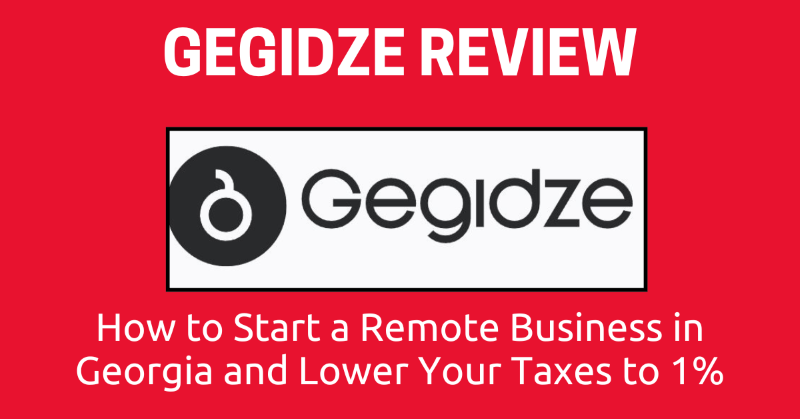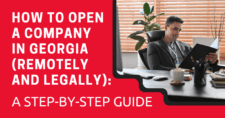
This article will take approximately 20 minutes to read. Don't have the time right now? No worries. Email the ad-free version of the article to yourself and read it later!
Start a remote business in Georgia and pay just 1% tax. Learn how Gegidze helps freelancers and founders set up fully online, fast and legally.
Most “digital nomad” content focuses on finding the perfect coworking space in Bali. Here’s what they should be talking about: how to legally structure your growing business so you’re not handing 40%+ of your profits to governments while living out of a suitcase.
At ExpatDen, we’ve navigated this challenge firsthand. Our team has operated through an offshore company in Hong Kong since 2015, and while it’s served us well, we’re always searching for better solutions. Especially when it comes to reducing taxes, minimizing paperwork, and ensuring long-term sustainability.
That’s exactly how I discovered Georgia.
Here’s the backstory: There was a golden era when European companies could outsource to Eastern Europe and get exceptional quality at half the price, without the cultural barriers that sometimes arise in other regions. While working with BeyondP2P (close friends of mine) to do due diligence on companies in the Baltics (you can check out their reviews on Indemo, Twino and InSoil to see what I worked on), I connected with numerous entrepreneurs already established in Eastern Europe.
And from them I learned a crucial insight: Eastern Europe has changed: those €1 beers in Riga’s clubs I remember from 20 years ago are long gone. As costs skyrocketed across the Baltic states, smart companies began searching for the next frontier that could deliver the same value proposition. That frontier? Georgia.
Aside from lower costs, the country offers some of the most compelling tax advantages I’ve encountered anywhere. Based on a recommendation from one of the companies I reviewed, I decided to look into Gegidze – a company that streamlines the entire setup process online, helping you achieve tax rates as low as 1%.
Intrigued by the possibilities, I went straight to the source. In this comprehensive guide, I’ll share everything I learned from my conversations with the Gegidze team: how the setup actually works, what it costs, and exactly how they can help you launch and operate a remote business in Georgia while dramatically reducing your tax burden.
Disclaimer: This article may include links to products or services offered by ExpatDen's partners, which give us commissions when you click on them. Although this may influence how they appear in the text, we only recommend solutions that we would use in your situation. Read more in our Advertising Disclosure.
Contents
- Who Did I Talk To?
- Who Is Gegidze and What Do They Do?
- Why Georgia?
- Why Choose Georgia Over Estonia or the UAE?
- How Do Taxes and Business Structures Work in Georgia?
- Do You Need to Worry About Double Taxation?
- How to Set-Up a Remote Company in Georgia?
- How Long Does It Take to Set Everything up?
- How Do Banking and International Payments Work in Georgia?
- Can you use PayPal, Wise, Revolut, or Payoneer?
- What Are the Setup and Ongoing Costs for a Business in Georgia?
- Is the Price Worth It?
- What Does It Take to Maintain a Business in Georgia?
- How Do You Hire Employees in Georgia?
- What Are the Challenges of Doing Business in Georgia?
- What’s Gegidze’s Track Record Like?
- Gegidze 10% Discount Coupon Code
Who Did I Talk To?
I had the chance to interview Valerian Gegidze, Founder and Managing Director, and Mary Giunashvili, Digital Marketing Lead, at Gegidze. They walked me through everything from business registration to ongoing compliance and how they support digital entrepreneurs like us.
Here’s what they shared with me about the process, the benefits, and what to expect when launching a remote business in Georgia.


Who Is Gegidze and What Do They Do?
Gegidze is basically your behind-the-scenes team that handles everything from consulting and business registration to accounting, payroll, and ongoing compliance.
Their services cover everything from:
- Setting up a company or registering as an Individual Entrepreneur (IE)
- Optimizing taxes for freelancers and teams
- Opening business bank accounts
- Monthly bookkeeping, payroll, and compliance
- Employer of Record (EOR) services if you want to hire in Georgia
- Residency, immigration, and back office support
Why Georgia?
Georgia is one of those countries that often gets overlooked. Most remote founders I talk to usually go straight to Estonia, Singapore, or Hong Kong (like we did). These places are well-known for their business setups, but now Georgia is quickly gaining traction, especially among digital nomads, freelancers, and online entrepreneurs.
And for good reason.
Georgia offers a rare mix of low taxes, simple compliance, and a fully remote setup process, all without the high costs or complexity you find in more traditional offshore hubs.
Here’s why more people are now choosing Georgia to register their remote businesses:
- Low tax rates: Freelancers and solopreneurs can register as Individual Entrepreneurs (IE) and pay just 1% tax on income up to around €160,000 per year. For tech companies, Georgia’s IT Park offers 5% corporate tax with 0% VAT and dividend tax.
- No tax on reinvested profits: Keep your profits in the business and you won’t pay dividend tax.
- Simple bureaucracy: You can set up your business in just one day with minimal paperwork.
- Fully remote setup: You don’t need to be in Georgia to register your company. Everything can be done online with a Power of Attorney.
- Affordable cost of operations: Compared to Western Europe or the US, Georgia is much more affordable in terms of rent, salaries, and services.
- English-speaking talent: Especially in tech, design, and customer support, making it easier to build a team if needed.
- Easy compliance: The tax filing and reporting process is clear and lightweight. No need to hire a full legal team to stay compliant.
Plus, compliance is simpler compared to countries like Estonia or the UAE.
Why Choose Georgia Over Estonia or the UAE?
If you’re comparing options for setting up a remote business, Georgia offers some clear advantages:
- Much lower tax rates
- Faster and easier setup
- No need for a local partner or shareholder
- No minimum capital requirement
- Lower setup and running costs overall
Quick Comparison: Georgia vs Estonia vs UAE
| Country | Freelancer Tax Rate | Corporate Tax | Setup Cost | Compliance |
| Georgia | 1–5% | 5–15% | Low | Simple |
| Estonia | 20% (on distributed profits) | 20% | Moderate | Moderate |
| UAE | 0–9% (in free zones) | 9%+ | High | Complex |
*Just a heads-up: This is a general comparison. The details can vary depending on your setup, and things like tax rules can change. So it’s always good to double-check.
How Do Taxes and Business Structures Work in Georgia?
While there are various ways to set up a business in Georgia, for digital nomads, remote workers, and online entrepreneurs, the two most popular options are
- Individual Entrepreneur (IE)
- Limited Liability Company (LLC)
Let’s take a closer look at each one.
IE (Individual Entrepreneur)
If you’re working on your own, like freelancing, consulting, coaching, or doing client work, the IE setup is probably the easiest and most tax-friendly choice.
Here’s what makes it appealing:
- You pay 1% tax on income up to around €160,000 per year**
- Anything over that is taxed at just 3%
- No VAT unless you pass a certain revenue threshold
- No salary requirements, so you don’t have to deal with payroll
- Monthly compliance is simple and handled by Gegidze
- The entire registration can be done remotely
**If your income is over €160,000 per year for 2 consecutive years, you might lose your Small Business status.
It only takes 1–2 business days to register as an IE – after which it can save thousands each year and while being relatively stress-free to manage.
Tip: The 1% tax status (called “Small Business” status) doesn’t activate until around the 25th of the month. So it’s better to wait until that kicks in before you start operating. Otherwise, your income could get taxed at the standard rate of 20%.
LLC (Limited Liability Company)
If you’re planning to hire people, raise funding, or build something bigger, then setting up an LLC makes more sense. On top of the flexibility, you can also apply for Georgia’s special tax regime under the IT Park scheme, which offers some of the best tax benefits as seen below:
Benefits:
- 5% corporate tax
- 0% VAT
- 0% dividend tax
To be eligible for this exemption, you’ll need
- At least 2 years of experience in the IT industry as a company
- a legal business address in Georgia
- a real team working on international projects. This includes developers, designers, product managers, and anyone directly involved in delivering your services
The whole idea behind this regime is to attract real businesses to relocate and hire local talent, not just set up a shell company. So you’ll need to show that your operation has substance, not just paperwork.
Like IE, the setup process is quick, usually 1–2 business days. But the special tax status takes longer. You’ll need to apply, and it can take 2–3 months to get approval from Georgia’s Revenue Service and Ministry of Finance.
Until that approval comes through, you’ll be taxed under the standard rate of 15 to 20 percent. So just like with IE, you should wait for the special status to be active before you start invoicing or generating income.
Case Study
One founder from the EU moved his consulting income to Georgia with under the 1% IE regime. In the first year alone, he saved over €30,000 in taxes while staying fully compliant. After that, he scaled up and used an EOR service to build a local team. He did everything through Gegidze.
Do You Need to Worry About Double Taxation?
One common concern is whether you’ll be taxed both in Georgia and your home country.
Georgia has tax treaties with many countries that help you avoid this. If you’re paying tax in Georgia and your home country has an agreement in place, you can often:
- Claim a foreign tax credit for taxes paid in Georgia
- Or get an exemption on that income back home
That said, countries like the US still tax based on citizenship. So if you’re American, you still need to file a US return, but you may not owe much if you’re already paying taxes in Georgia.
It’s a good idea to check the rules for your specific country or speak with a tax advisor who understands international business setups.
You can check the official Georgian Revenue Service website for more information.
How to Set-Up a Remote Company in Georgia?
One of the biggest reasons I’m bullish on Georgia is how easy it is to get started.
If you use a service like Gegidze, everything can be done remotely. You don’t need to fly in, meet anyone in person, or go through piles of paperwork. If you’ve ever set up companies in places like Hong Kong, Singapore or Estonia, this will probably feel even simpler.
You just need to prepare a few documents, get them notarized and apostilled, and send them to Gegidze.
Here’s what you’ll need:
- A copy of your passport
- A signed Power of Attorney (so they can act on your behalf)
Once they have everything, Gegidze will act as your local representative. They’ll handle the registration, help you open a bank account, and apply for the correct tax status like the 1% Small Business rate for IE.
And that’s it. You don’t need to set foot in Georgia to get it done.
This part really stood out to us. When we set up our offshore company in Hong Kong, we had to fly there multiple times, once to register the company and again just to open a bank account. But with Georgia, everything can be done online from start to finish. No flights, no in-person meetings, no wasted time.
Side note: Georgia is also working on a digital signature system for non-residents, which should make the process even easier in the near future.
How Long Does It Take to Set Everything up?
The actual registration process for both IE and LLC usually takes just 1 to 2 business days. But that doesn’t mean you should start running your business right away. To get the full tax benefits, you’ll need to wait until your special tax status is approved.
- For IE, the 1% “Small Business” status is typically activated around the 25th of each month. If you start earning before then, you might be taxed at the standard 20% rate.
- For LLC, approval for a special tax regime, like IT Park , can take 2 to 3 months, since the application needs to go through both the Revenue Service and the Ministry of Finance.
How Do Banking and International Payments Work in Georgia?
Once your business is registered, the next step is setting up your bank account. In Georgia, that’s pretty straightforward too, and you don’t need to be there in person.
Gegidze helps you open accounts with Bank of Georgia, TBC Bank, and other major local banks. These banks support:
- Multi-currency accounts (EUR, USD, GBP, GEL)
- International debit cards
- Online banking platforms (that are modern and easy to use)
Everything can be set up remotely as part of the incorporation process, so you won’t need to visit a branch yourself.

Can you use PayPal, Wise, Revolut, or Payoneer?
Yes, with some limitations.
- PayPal: You can use it to receive payments, but you can’t withdraw funds directly to Georgian bank accounts.
- Wise and Payoneer are the most popular alternatives. Most Gegidze ‘s clients use them to receive international payments, convert currencies, and then send the money to their Georgian business account.
What Are the Setup and Ongoing Costs for a Business in Georgia?
If you want to set up a remote company in Georgia through Gegidze, here’s what you’ll need to pay.
One-Time Setup Fees
- IE (Individual Entrepreneur): €995
- LLC (Limited Liability Company): €1,225
These fees cover:
- Document preparation
- Legal support
- Business registration
- Power of Attorney processing
- Government fees
- Business bank account setup
Gegidze handles the entire process, so you don’t need to deal with anything yourself.
Ongoing Monthly Costs
- IE bookkeeping: From €45/month
- LLC tax accounting and filing: From €195/month
These plans include full monthly compliance, tax filing, address leasing, and a dedicated account manager who handles all the admin work for you.
Audit Fee
Another great thing about registering in Georgia with Gedgize is that year-end filing is included in the monthly package.
- For IE, there’s no audit requirement, regardless of how much you earn.
- For LLC, audits are only needed if you cross certain thresholds, specifically, over €20 million in annual revenue or 50 to 200 employees.
What if you have a high number of transactions?
Pricing may vary depending on how many transactions your business runs each month and how complex your setup is. Gegidze will review this with you and give you a clear quote upfront. No hidden fees.
Is the Price Worth It?
In my opinion, yes. It’s a pretty solid deal. Of course, setting up a business isn’t free, but the pricing is actually quite reasonable, especially when you consider that everything can be done online. There are no extra costs for flights, hotels, or in-person appointments. It’s a smooth, remote-friendly setup from start to finish.
And when you compare it to other countries, it becomes even more appealing. Many small businesses I know, including our own, pay around €150 a month just for bookkeeping, and then face a hefty audit fee at the end of the year.
In Georgia, bookkeeping for IE starts at just €45/month, and there’s no audit requirement at all. Even for LLCs, audits are only required if you’re generating more than €20 million in revenue or employing over 50 to 200 people. It’s a much more cost-efficient system, especially for small remote teams and solo founders.
You can contact Gegidze to find out more.
What Does It Take to Maintain a Business in Georgia?
Here’s another interesting question I asked Gegidze: what does it actually take to maintain your business once it’s up and running? I wanted to make sure that the setup wasn’t just easy on paper, but also practical long-term.
For example, in Thailand, it’s pretty easy to set up a business, but maintaining it is a different story. There’s a ton of paperwork, tax filings, and admin that piles up fast. We’ve been through that before.
So how does Georgia compare?
Turns out, it’s much more manageable.
Monthly or Yearly Obligations
- IE: You’ll need to submit a monthly income report and an annual declaration. It’s simple, and Gegidze handles it all for you.
- LLC: The requirements are a bit more involved, monthly reporting, payroll (if you have staff), VAT filings (if registered), and an annual report. Still, it’s far more straightforward than what we’ve dealt with in other countries.
What if you miss a deadline?
The fines for late filings are small at first, but they stack up quickly if ignored. To prevent this, Gegidze sends automated reminders and takes care of the filings on your behalf. So it’s one less thing for you to worry about.
How Do You Hire Employees in Georgia?
While ExpatDen doesn’t have any plans to hire employees in Georgia (we’re happy with keeping our global team the way it is), I still asked Gegidze what it would look like if we wanted to hire locally. The process turns out to be surprisingly easy.
Gegidze can handle the entire process for you through their Employer of Record (EOR) service. That means they take care of:
- Payroll
- Employment contracts
- Benefits
- Local labor law compliance
They even have a platform to help you hire employees in Georgia.
What Are the Challenges of Doing Business in Georgia?
No setup is perfect, and Georgia has a few limitations to keep in mind.
- Stripe isn’t supported (yet). This can be a deal-breaker for SaaS or eCommerce businesses that rely on it.
- PayPal withdrawals aren’t possible to local banks either, but most people use Wise or Payoneer as workarounds.
- Occasional banking delays due to compliance checks can happen, especially when dealing with international wires or large transfers.
That said, Georgia is improving quickly. The government is positioning it as the “Switzerland of the Caucasus” or even “Dubai Vol. 2”. If the momentum continues, these issues may become less of a concern in the near future.
What’s Gegidze’s Track Record Like?
I always like to know who we’re working with, so I asked Gegidze about their experience helping other remote founders and businesses. Here’s the low-down:
How long have they been doing this?
Gegidze has been operating since 2017. Since then, they’ve supported:
- Over 300 startups, SMBs, and enterprises
- Hundreds of freelancers and solo founders
- Clients from 20+ countries including Europe, North America, Australia, Israel, and the UAE
What types of businesses do they typically work with?
Their clients come from all across the digital economy. These include:
- SaaS companies
- Consulting firms
- Design studios
- Ecommerce brands
- Remote agencies
- Freelancers in IT and creative fields
What are people saying about them?
The feedback has been consistently positive. Here are a few direct quotes from their clients:
“Moved my digital agency to Georgia with Gegidze’s help. Went from 20% tax to just 1% and it’s all handled by them. Huge win.” — Alex from Germany
“I didn’t think remote company setup could be this smooth. I got my residency, IE, and bank account without stepping foot in Georgia.”
— David from the UK
“For my EU SaaS, Gegidze helped optimize taxes and set up payroll for my whole remote team. Super professional.”
— Liran from Israel
Gegidze 10% Discount Coupon Code
If this sounds like something that could work for you, the best next step is to talk to Gegidze directly. They’ll walk you through the process, answer your specific questions, and help you figure out whether Georgia is a good fit for your business.
If this sounds like something that could work for you, the best next step is to talk to Gegidze directly. They offer a free demo, where they’ll walk you through the process, answer your specific questions, and help you figure out whether Georgia is a good fit for your business.
I’d recommend you take the demo to see if their service suits your needs.
You can check them out or book a free demo using this link and enter the coupon code Expatden10 to get a 10% discount when using their service.





